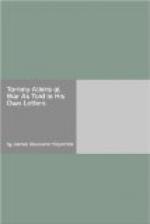Every word of this admirable official message is borne out by the men’s own version of their experiences of artillery fire. “At first the din is terrific, and you feel as if your ears would burst and the teeth fall out of your head,” writes one of the West Kents, “but, of course, you can get used to anything, and our artillerymen give them a bit of hell back, I can tell you.” “The sensation of finding myself among screaming shells was all new to me,” says Corporal Butlin, Lancashire Fusiliers, “but after the first terrible moments, which were enough to unnerve anybody, I became used to the situation. Afterwards the din had no effect upon me.” And describing an artillery duel a gunner declares: “It was butcher’s work. We just rained shells on the Germans until we were deaf and choking. I don’t think a gun on their position could have sold for old iron after we had finished, and the German gunners would be just odd pieces of clothing and bits of accouterment. It seems ‘swanky’ to say so, but once you get over the first shock you go on chewing biscuits and tobacco when the shells are bursting all round. You don’t seem to mind it any more than smoking in a hailstorm.”
Smoking is the great consolation of the soldiers. They smoke whenever they can, and the soothing cigarette is their best friend in the trenches. “We can go through anything so long as we have tobacco,” is a passage from a soldier’s letter; and this is the burden of nearly all the messages from the front. “The fight was pretty hot while it lasted, but we were all as cool as Liffy water, and smoked cigarettes while the shells shrieked blue murder over our heads,” is an Irishman’s account of the effect of the big German guns.
The noise of battle—especially the roar of artillery—is described in several letters. “It is like standing in a railway station with heavy expresses constantly tearing through,” is an officer’s impression of it. A wounded Gordon Highlander dismisses it as no more terrible than a bad thunderstorm: “You get the same din and the big flashes of light in front of you,




